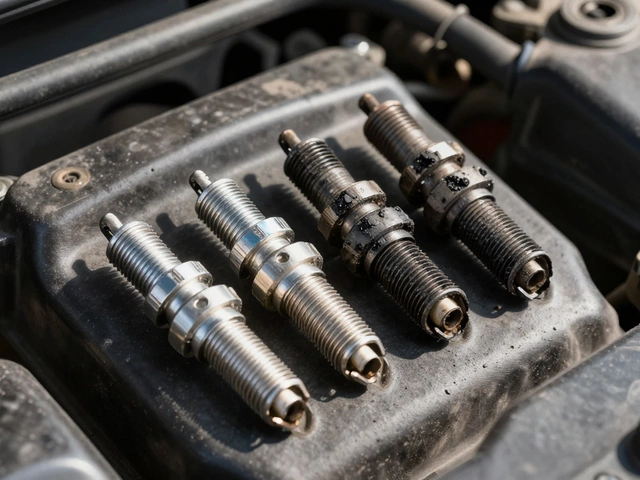Spark Plug Lifespan: How Long Do They Really Last?
Ever wondered why your engine sometimes misfires or why fuel efficiency drops? Most of the time it’s the spark plugs wearing out. Knowing how long spark plugs last helps you avoid surprise breakdowns and saves money on unnecessary repairs.
What Determines Spark Plug Life?
Two big things decide a plug’s lifespan: the type of plug and how you drive. Copper plugs are cheap but usually need changing every 20‑30 k m. Iridium or platinum plugs can stretch to 80‑100 k m because they’re harder and resist wear. High‑rev sport driving, frequent short trips, and dirty fuel all speed up the wear process. If you live in a dusty area or tow heavy loads, expect the plugs to age faster.
Signs It’s Time for a New Plug
Don’t wait for the check engine light. Look out for rough idle, trouble starting, or a drop in power when you step on the gas. A noticeable increase in fuel consumption is another clue. You can also do a quick visual check: pull the plug, look at the electrode. If it’s rounded, covered in deposits, or the gap has widened, replace it.
Most manufacturers list a recommended interval in the owner’s manual. If you can’t find it, a good rule of thumb is to inspect the plugs every 30 k m and replace them at the first sign of wear. For iridium or platinum plugs, you might get away with 60‑80 k m, but the inspection still matters.
Changing spark plugs yourself is pretty straightforward. You need a plug socket, a torque wrench, and the correct gap gauge. Always replace plugs in sets – swapping just one or two can cause uneven combustion and hurt performance.
Remember, a fresh set of plugs can improve acceleration, smooth out idle, and even boost mileage by a few percent. It’s a cheap fix that pays off quickly.
If you’re not comfortable doing the job, a quick visit to a local garage will cost less than a major engine repair caused by prolonged plug neglect. Ask the mechanic to check the plug condition during routine service – it’s a fast check that can save you headaches later.
Bottom line: keep an eye on your plug type, driving habits, and the signs of wear. Regular checks and timely replacement will keep your engine humming and your wallet happy.

Understanding What Shortens Spark Plug Life
Spark plugs are essential for your vehicle's engine performance, but their lifespan can be cut short by various factors. Common culprits include excessive heat, oil fouling, and poor fuel quality. Simple maintenance tips can help extend their life. Paying attention to warning signs can save both money and hassle in the long run.
CONTINUE READING






